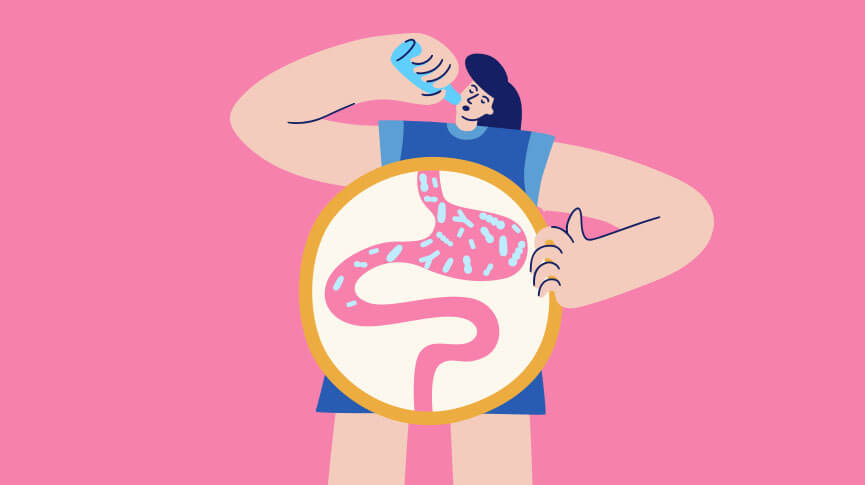Why Gut Health Matters: Probiotics and Prebiotics

We’re surrounded by health and wellness trends from biohacking to adaptogens to green juice. It can be fun and incredibly beneficial to try out different trends and methods and see what works for you. But sometimes the secret to health is getting back to basics. One of the most well-known adages in the English language is “You are what you eat” – and for good reason! What you eat truly does make a huge impact on your health, energy levels, cognition, and so much more.
It’s not just a matter of what you eat though, it’s the overall health of your gut and everything that it affects. Much like the rest of this planet, your gut is full of different organisms, especially bacteria. Most of these are beneficial bacteria that we have a symbiotic relationship with. Not only are these bacteria beneficial, but they’re also crucial for a healthy body. While the food that you eat absolutely matters when it comes to gut health, there are other steps you can take to help heal and boost it.
One of the best tools for gut health? Probiotics and prebiotics. Let’s learn about the importance of gut health and how you can use probiotics and prebiotics to live your best gut health life.
Probiotics vs Prebiotics
First off, it’s important to understand just what probiotics are. Just like many other areas of the body, like the vagina and the mouth, your gut has its very own microbiome. That’s like a tiny ecosystem of different organisms that work hard to keep you alive and functioning. These beneficial microorganisms, or flora, are made up of bacteria and yeasts.
In an ideal world, you have a perfectly balanced gut microbiome, but of course – that’s not always the reality. There are so many things that can affect the flora in your gut like taking antibiotics and eating food that is overly processed or was grown in depleted soils. That’s where probiotics come in. Although probiotics already exist within your microbiome, they can also be ingested through supplements and certain foods. When looking for probiotic supplements it’s best to look for supplements made with the bacteria Lactobacillus or Bifidobacterium. These will be labeled on bottles. Some probiotic supplements need to be refrigerated while others are freeze-dried. Keep in mind your lifestyle and whether it makes more sense to have ones that you can easily take on the go – especially if you travel a lot!
While probiotics are pretty well known, prebiotics have flown a bit under the radar, so let’s shine a spotlight on them. Prebiotics are specific nutrients in food. The body doesn’t actually absorb these, however the activity and growth of probiotics. Prebiotics and probiotics go hand in hand!
What are some foods that are high in prebiotics?
- Apples
- Leeks and onions
- Flaxseed
- Oats and Barley
- Seaweed
You understand what probiotics and prebiotics are, but why should you take them?
The Benefits of Gut Support
Gut health isn’t just about digestion and stomach aches – although those can certainly be helped by increasing your intake of probiotics. What are some other major benefits of ingesting probiotics?
Brain Health and Cognition:
Have you heard of the mind-gut connection? The direct link between your brain and your belly? More and more research has come out showing the benefits of probiotics on your mental health. A variety of studies have shown how probiotics can help treat symptoms of mental health disorders like anxiety, depression, stress, and obsessive-compulsive disorder. They may even help boost memory and cognition!
Allergies and Skin Conditions:
New research suggests that probiotics may help support certain allergies, especially dairy allergies. They can also help support some skin conditions like eczema.
Immune System:
Your immune system works hard to fight off harmful pathogens like viruses and bacteria (the bad ones), and maintain a healthy inflammation cycle. You can help your immune system out by taking probiotics. They may also help reduce the risk of UTIs and respiratory infections.
Cardiovascular Health:
Did you know that cardiovascular disease is the number one cause of death for women in the United States? You can help decrease your risk of developing heart disease by ingesting probiotics. How do they help boost heart health? By potentially lowering blood pressure and reducing cholesterol.
Gastrointestinal Issues:
Of course one of the most obvious reasons for taking probiotics is for gastrointestinal issues. Ingesting probiotics may be able to help decrease symptoms of irritable bowel syndrome.
Probiotic-Rich Foods
While it can be helpful to take probiotic supplements, that’s not the only way to get your dose. There are endless probiotic-rich foods out there that you can load up on to increase your intake of probiotics.
Here are some awesome probiotic-rich foods to incorporate into your diet:
- Sauerkraut
- Kimchi
- Yogurt and kefir
- Fermented soy products like tempeh and miso
- Kombucha
- Pickled veggies
- Some cheeses like cottage cheese and mozzarella
- Most fermented foods
So grab your prebiotics, probiotics, and favorite fermented foods, and go get your gut health on!

Natasha (she/her) is a full-spectrum doula and health+wellness copywriter. Her work focuses on deconstructing the shame, stigma, and barriers people carry around birth, sex, health, and beyond, to help people navigate through their lives with more education and empowerment. You can connect with Natasha on IG @natasha.s.weiss.


